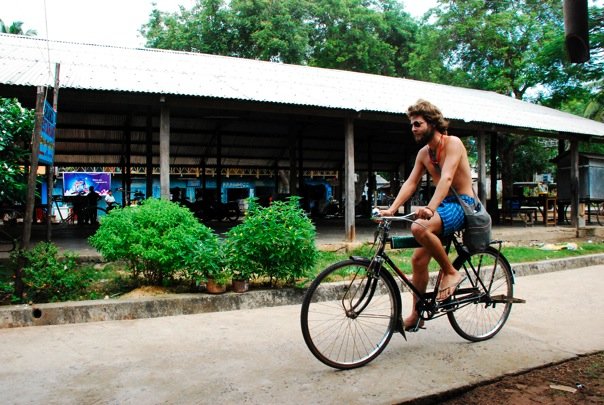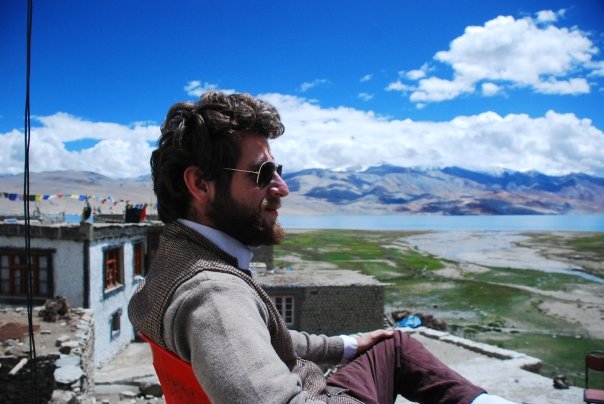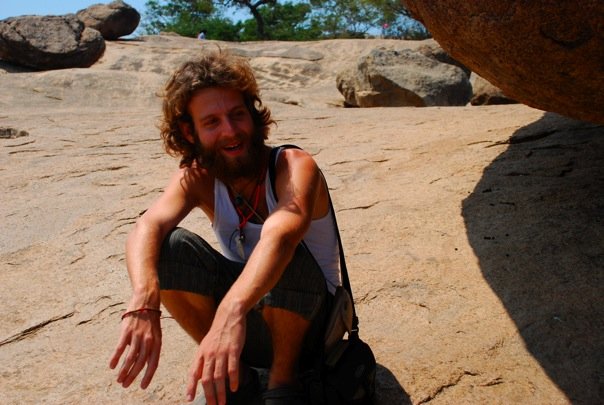Today we’re interviewing Yoav Lutzky, who works on a border crossing Wiki to help fellow land travelers successfully and safely navigate border crossings around the world. Yoav has crossed borders on foot or via other overland means in some pretty remote corners of the planet. Check out his story and project, as well as the information below regarding how to get involved!
Hi Yoav! Thanks so much for joining us. For those who don’t know, could you tell us a bit about your border crossing Wiki project?
Hi, it’s great to be here!
Well, Border Crossing Wiki is a project that aims to help travelers share information on border crossings. I am trying to get travellers to contribute information from their personal experience and knowledge on different border crossings. I have formatted the pages in the Wiki to be simple to understand and to contain all the information needed when attempting to cross a border.
What initially gave you the idea for this project? Have you encountered border-crossing issues that inspired the Wiki?
Well, back in 2009 I was already traveling for a while in Asia and Europe. Whilst in Berlin I decided to travel overland from Berlin to Japan, through Czech Republic, Slovakia, Ukraine, Russia, Mongolia, China and eventually take a ferry from Shanghai to Osaka, Japan. I have encountered many border crossings along the way, and some were troublesome. A few months ago I was telling friends about some of my traveling experiences and realized that a lot of my stories involve border crossings, usually something funny that went wrong, something I hadn’t prepared for and only discovered when I got to the border. This gave me the idea to create a project to help travelers share information on border crossings. I wanted it to be simple to share information, but also simple to receive it. This gave me an idea to create a Wiki.
Why is a Wiki the venue you chose for realizing the project?
What is so unique about a Wiki is that it can be edited by anyone easily and on the spot. Any person who chooses to contribute information improves the last person’s contributions.
I think that if we could build a community of travelers that will add and edit pages on the Wiki we could have a reliable and up to date border crossing database, making the travels of overland travelers much easier.
I have used other websites whilst traveling such as hitchwiki.org, and I loved the idea of travelers chipping in and adding information that is relevant for hitchhikers. I want to build a Wiki to help overland travelers. The wisdom of crowds is magnificent.
What kind of information is most important when travelings are preparing to cross borders?
It’s very important to come prepared when crossing borders. Border crossings are not airports, and in many countries they are not used to seeing many tourists. This means that all the trivial things whilst traveling might not be so trivial in remote border crossings, things such as exchanging money, finding transportation, special regulations and so on.
Border crossings are also a place where scams thrive, especially in developing countries. It is always wise to know about them. You would not believe what kind of scams exist out there. Cons can go as far as impersonating border officials to steal your passport or confiscate (steal) your belongings. This is also a valuable part of the Wiki, to help us share such information that is difficult to come by on different forums, government websites and even guidebooks that are usually not up to date with the newest scams.
Any particularly troublesome borders you’ve had to cross in your personal experiences traveling? Any that were easier than anticipated?
I had some trouble crossing the border from Russia to Mongolia. I read a travel guidebook that said the border was open until 17:00, so when I arrived at the border at 14:00, I was happy to know I would be arriving in Ulaan Bator, Mongolia that evening. From the guidebook I knew that I couldn’t cross the border by foot and had to hitch a ride with a car/truck to cross the border. The guidebook said this shouldn’t be a problem as there is a lot of traffic over the border. The guidebook even stated how much I would be expected to pay the truck driver to take me across.
So I arrived at the border thinking I was prepared. Liittle did I know… When I got to the border there were about 20 Mongolian women running to every car that arrived at the border trying to hitch a ride and I didn’t have a chance to get a ride before them. The traffic that was promised in the guidebook did not exist and a car came once every 20-30 minutes, but I was still sure I’d make the crossing the same day. Eventually I found a ride, this was around 15:30, I was still sure I’d cross the border the same day.
Little did I know…Another thing the guidebook did not mention was that the Russians don’t care what time you reached the border, they only let 1 car/truck into the terminal at a time. You could have even reached the border at 10:00 a.m. in the morning, but if your turn didn’t come up until 17:00 they just close the border and tell you to come tomorrow.
At 16:50 I started to worry, understanding I was not going to cross the border today, and I am in the middle of nowhere in a small Russian town. It’s already dark and I have no idea where I can spend the night. With the little bit of Russian I spoke I managed to convince a taxi driver that takes people back and forth over the border to let me sleep in his taxi van and first thing in the morning cross with him. I ended up spending the night with 2 girls I was travelling with in a van in the middle of nowhere, putting every piece of clothing we had as the temperature dropped to -10C during the night.
One of the easiest border crossings I remember passing was between India and Nepal. I remember walking down the road to cross the border when suddenly I hear a few people trying to get my attention. I look back and on the side of the road there are 3 men sitting next to a small school desk. They did not seem like any kind of officials at all. I came up to them and they explained that they are border control and they need to stamp me out of the country. I found it funny that they only noticed me after crossing them, and I am sure some people cross without anyone noticing, Nepalese and Indians cross back and forth and no one cares. That border crossing was a breeze. The only thing I found difficult was that in the guidebook I read before crossing it stated certain opening times of the border, but when I actually arrived at the border I discovered different times.
How can readers who want to contribute to the border crossing Wiki go about doing so?
It is simple to edit a Wiki, it is done on the website and is straightforward. There is a simple explanation on how to edit or add a page on the Wiki, and we appreciate any information that is contributed. If a page about a certain border crossing already exists on the Wiki, it is possible for readers to edit information that has changed or add new information.
The Wiki is located at www.bordercrossingwiki.com
To see an example of a finished border crossing page ( though it’s never really finished) you can check out the Irkeshtam Pass Border Crossing page here.
I go over all the contributions and make sure they are in the right place, so don’t worry if you think you’re doing it wrong. Just post the information where you think it should go, and I will make sure it is in the right place.
If anyone wants to become more involved in the Wiki or needs some help using or editing it, they can contact me at bordercrossingwiki@gmail.com
Lastly, where do you hope to see the Wiki go in the future? What’s the end goal for your project, and how do you see it helping travelers?
I hope the project eventually gains popularity amongst overland travelers, and I am trying to recruit as many people as possible to contribute information. I really believe that if we get a substantial amount of people contributing information to the Wiki we can build a border crossing database that doesn’t exist out there at the moment. I believe such a Wiki is very valuable for travelers as a whole, but especially for those who are dedicated to overland traveling.
I also hope to convert travelers who fear traveling overland in remote places, by making the information they need to travel overland accessible and giving them peace of mind whilst attempting to cross borders.
Thanks so much for chatting with us, Yoav! Good luck with the project; we love it!
Thank you! I love your website and I really believe your readers can benefit from this project and help it grow.



